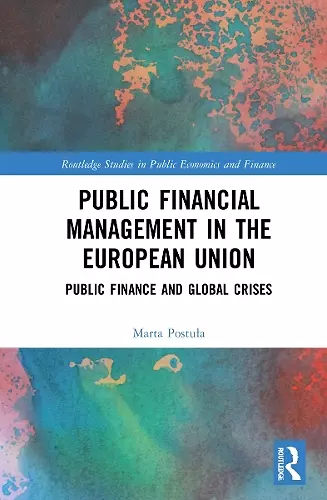Public Financial Management in the European Union
Public Finance and Global Crises
Format:Hardback
Publisher:Taylor & Francis Ltd
Published:19th Apr '22
Currently unavailable, and unfortunately no date known when it will be back
This hardback is available in another edition too:
- Paperback£41.99(9781032118918)

This book reveals how to create efficient institutions and coordinate policy on a transnational scale to ensure that European Union integration can best meet social needs. It offers a combined technocratic and humanist perspective on the discussion of public financial management. The state, as part of its public policy, should seek to preserve our social and environmental values, yet there are mounting imbalances in society which point to the growing role of the state in minimising them. Under such circumstances, it is worth reflecting on how new challenges could require updated, more complex formulas, to deal with crises in current times and for social and economic policy making by states and the European Union generally, which would ensure their compatibility with the world financial markets. The work offers an in-depth and unique performance analysis of European Union institutions compared to the national entities of EU Member States. It contributes to the ongoing debate on global public goods and the processes involved in managing their provision. Further, it discusses public finance management instruments, indicating their historical evolution in practice and their effectiveness measured with the Human Development Index. The author presents a proposal of how to manage global, European and national public goods across three areas: environmental protection, transnational infrastructure projects and social policy. The book analyses public financial management instruments used during the recent pandemic, making a distinction between regular and emergency instruments and assessing their effectiveness in specific economic situations. This will be of interest to researchers and students of economics and finance, as well as decision makers and practitioners from governments, international organisations and specific non-governmental organisations concerned with issues of public finance management.
Marta Postula’s book, Public Financial Management in the European Union, examines public policy implementation at the EU and national levels, based on strategy documents and alignment or misalignment in expenditures with the Community’s goals. Postula reminds readers of the importance of financial management based on transparent, sound terms, ready to meet the challenges of the day. Chapter five offers a simplified way of seeing tasks as domestic, EU-level, and global; this is particularly useful in context of crises like COVID-19, and the figures included brought a welcome visual representation. When activities can be conducted at the domestic level, they should be (for example, in poverty alleviation) and the chapter explains why, for the best, most effective use of public funds. This chapter is perhaps the book’s strongest contribution, though there is much to appreciate about the careful analysis and detailed discussion of the EU’s approaches, vis-à-vis the implementation seen in the Member States, and prospects for the future with the potential for further crises on the horizon. (The book) will be of interest to scholars and practitioners working in EU financial management study, and possibly as reading for a class on this or related topics. — Atkinson, C.L. Theme-based Book Review: Business, Government, and Neoliberalism. Public Organiz Rev22, 1313–1323 (2022). https://doi.org/10.1007/s11115-022-00648-3
ISBN: 9781032118901
Dimensions: unknown
Weight: 453g
240 pages